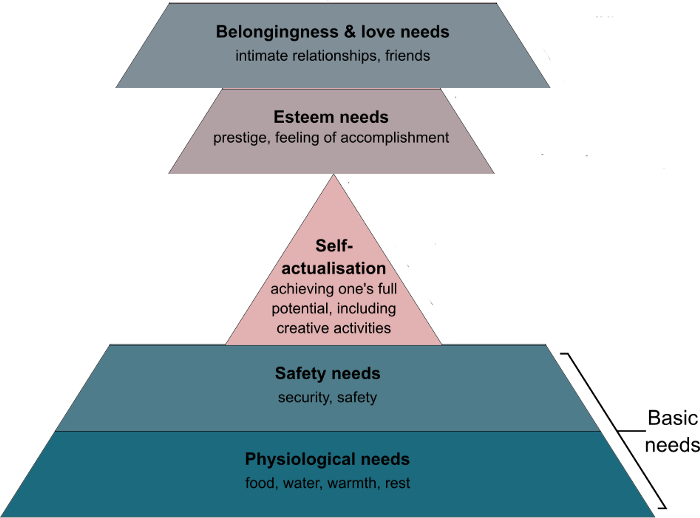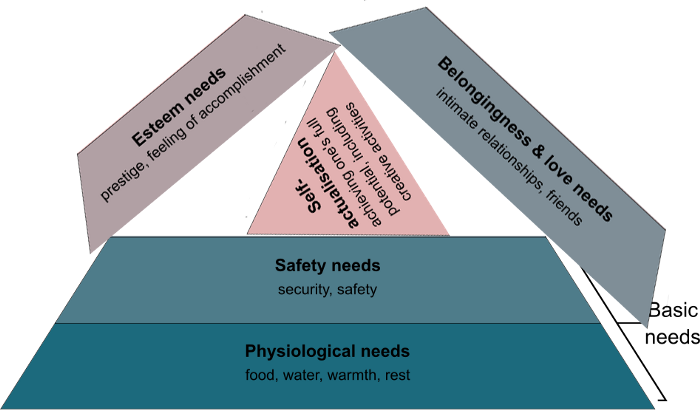Cover Image: Broken Hierarchy of Needs. Original version: Wikipedia
It’s not the secret to a happy life
I remember this conversation I had with my mentee two years ago:
P: “I watch motivational/inspirational videos for an hour before bed.”
Me: “How does that help you?”
P: “It doesn't, really. At first, it motivates me. I feel like I can accomplish anything in the world. Then, I sleep. When I wake up, it just sounds impossible.”
Me: “What would happen if you stopped watching those videos entirely?”
P: “Honestly, I think I’d feel better about myself. I’m tired of trying to be someone I’m not. I want to be better, but I want to be happy above all.”
I was reminded of that conversation when, three days ago, I read this wonderful piece by Marta Brzosko: Self-Improvement Is Killing Me.
For me, the big problem with self-improvement is at its core; it stipulates that you’re not adequate. Or, at least, a lot of people perceive it this way. No one can tell you what or who you need to be. The productivity hacks you find everywhere are suited for the writer who wrote them — if they’re writing from experience that is (most don’t).
I’ve written probably over 300 articles about ways to improve your life. All of it is BS. Kind of. Not everything I wrote will apply to everyone. That’s normal. No two human beings are the same.
There’s (almost) no truth in life. I find that reassuring, personally.
The number one rule to self-improvement is too never take it too seriously.
Self-improvement is an experiment that’s meant to be fun. I’ve certainly had my moments where it felt like a chore. Or moments when I felt it was making me sick. Or when I felt like I wasn’t human anymore — kind of like a lab rat, really.
Marta echoed that well in her piece:
I’m sick of self-improvement to the point that I need to vomit. — Marta Brzosko
It was the same with my mentee and for many people I’ve talked to over the past three years.
Does that resonate with you?
For the past three years, I’ve been testing various techniques, hoping to optimize my life. I ran self-experiments and tracked the results. Without realizing, I started seeing myself as a machine which, when well-maintained, would perform in a way that leads to “success.” — Marta Brzosko
You’re far from being alone. I’d even go so far as to say that it’s a trend. With the information business booming, you’re bound to see even more self-help “gurus” tell you what you should be doing to improve your life.
The vast majority of these gurus don’t have much experience with what they’re talking about. This isn’t a complaint, and it’s also not necessarily bad. There are very good reporters out there.
If Walter Isaacson were to write a book about the Top 10 Habits of the Super Successful, I’d likely buy it. Isaacson has written some of the best biographies on Steve Jobs, Benjamin Franklin, Leonardo DaVinci, and more. He’s very sharp at finding patterns.
That’s the key here: a good reporter is someone who can identify good patterns and turn it into a format that’s usable by as many people as possible.
Most of the self-improvement stuff you read about or watch online isn’t that. Pattern recognition isn’t a skill we’re very good at, but in a way, it’s one of the most important ones you can learn to use self-improvement well.
When you can identify what works and what doesn’t work for you without you having to waste valuable time trying to implement it in your life, you then don’t feel as much like a machine trying to accomplish things you weren’t even supposed to accomplish in the first place.
It’s okay if you…:
can’t wake up at 5am to perform an “optimal” morning routine.
can’t follow a strict schedule to accomplish 20 tasks in a single day.
don’t have full energy all day (no one does, at least, not naturally).
have no clue why you do what you do.
are not the most emotionally intelligent person out there (that’s greatly overrated these days).
are not in a rock-solid relationship (that doesn’t even exist).
are not a millionaire by 30 (or at any age).
are not like everyone else (celebrate your differences).
have a 9–5 job.
have a failed business.
These are all first-world problems.
If there’s one belief I had that was reinforced by having a baby, it’s this one:
The only constant in life is change.
You could just stop trying today, and things would change no matter what. Most change isn’t really in your control, so stop trying to change it. These days, you could just go with the flow and you’d be just fine.
Why is that?
Remember Maslow’s Hierarchy of Needs?
Source: Wikipedia
Every layer you go up in adds a new level of stress. Some of the most stressed-out people in the world are at the top of the pyramid — self-actualisation. One of the reasons is that they’re trying to skip a step — or two.
If you skip even one step, you’re getting ahead of yourself. Here’s the situation most people are trying to accomplish with self-help “porn”:
People are trying to entirely skip their psychological needs! It might be possible to achieve, but that would be damn impressive if you could pull it off!
Here’s what my mentee was trying to accomplish:
That’s doesn’t look very stable, does it? After a few weeks of trying that, here’s what happened:
Looks familiar?
Self-actualisation turned upside down. Esteem and belongingness needs fell to the side.
Frankly, I don’t know why it’s so sexy to go for prestige and feeling successful before you have better intimate relationships. You’d have no one to share it with anyway!
You want a secret to a happy life? How about this:
You don’t need self-actualisation.
The happiest people I’ve met barely had their physiological needs covered. View self-actualisation as a game. Once you’ve taken care of your other needs, entertain yourself with improvement experiments.
One habit I had before having a baby was to learn three new skills every month. People were asking me how I was able to do this. Well, I had every other need covered. I wasn’t taking it too seriously. For me, it was entertainment. I was learning new skills because it was fun.
Did I need to? Nope!
Did it make me feel good? Oh yeah!
If I were to do that today, while in “survival mode” with my newborn son, I’d be miserable. I’d set over-ambitious goals and fail at every turn, leading me to hate my life, even if my other needs would be covered.
I had to say “stop” on my self-improvement for the moment. It was tough at first, but that was the right call. In life, you’ll move up and down in the pyramid of needs. One day you’ll be at the top, another you’ll be back to the base. That’s fine.
Not only that’s fine, but that’s really what life is about: constant challenges.
When my mom talks about heaven and how everything is perfect there, I yawn. If you live for the challenges you’re getting thrown at, that’s really how you thrive. Not when life is easy.
So, here are two lessons I want to impart you with:
Don’t jump to your higher needs until you have the other ones covered; and
Never take self-improvement too seriously.
When self-improvement isn’t working for you anymore, it’s time to stop taking it so seriously.
You can do this!






